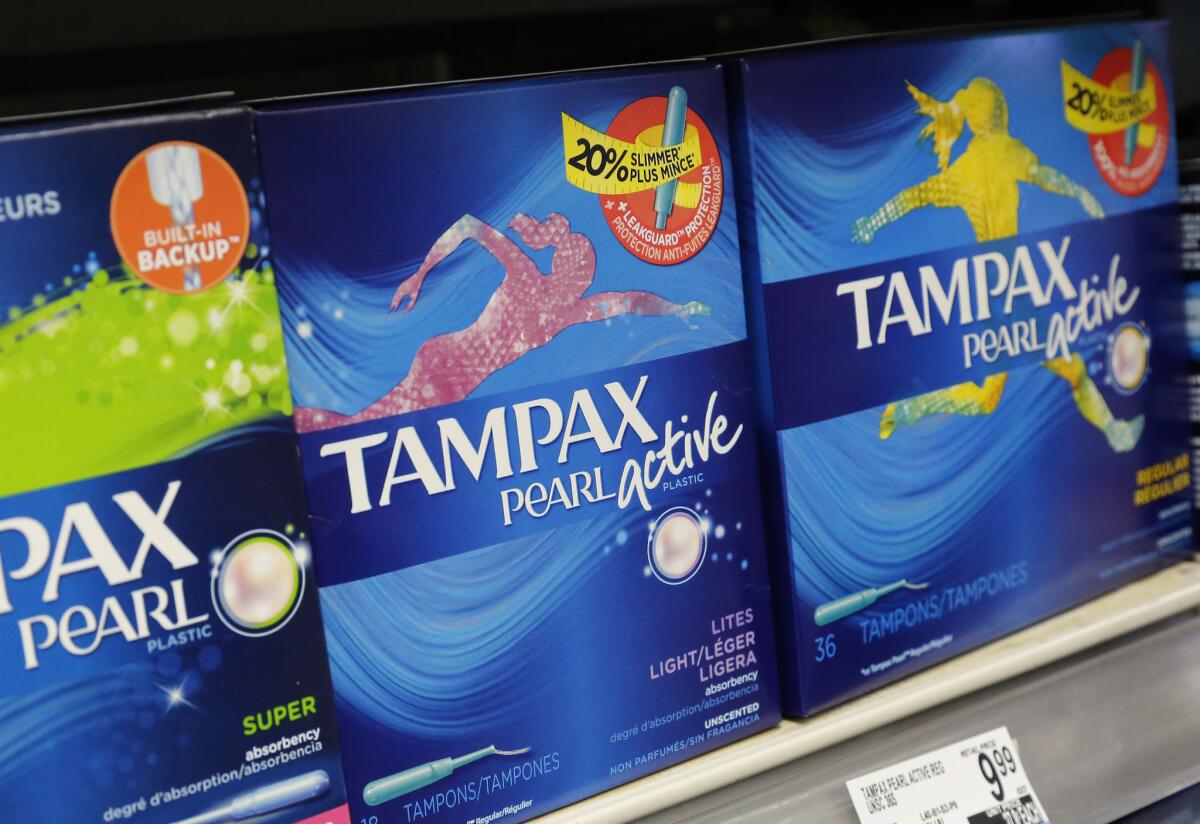Column: #FreeToBleed? No thanks. Sometimes, discretion is the better part of activism

Boxes of tampons are displayed in a pharmacy in New York. A group of women has filed a lawsuit accusing the state of unlawfully taxing feminine hygiene products, arguing that medical items are exempt from sales tax.
Call me a rebel, but I donât think menstruation needs a public relations initiative or a political movement.
I donât think women are oppressed or even repressed if they donât want to broadcast the inner workings of their reproductive systems. I donât think itâs tantamount to âbody shameâ if you get embarrassed when your purse falls open and spills out all manner of personal-care items (Iâm talking not just âfeminine productsâ but used tissues and crumb-encrusted Chapstick tubes, which are cringe-inducing in their own ways). I donât think modern feminism hinges on being able to post an Instagram photo of your bloodstained sheets and calling it a political statement.
If you donât know what Iâm talking about, allow me to refer you to the recent Newsweek cover story on the âfight to end period shaming.â It featured the above-mentioned photo (which Instagram twice removed from its site, setting off an uproar) and cited myriad examples of what might be called menstru-activism. Like much activism, the efforts of this movement consist of the largely symbolic, such as the hashtag #FreeToBleed, and the long overdue and deeply necessary, such as educating women about endometriosis and making sanitary products readily available in developing nations and to poor and homeless women in the United States.
You might also want to do a search on Thinx, which is underwear designed for getting your period in. Thinx is approaching cult status thanks to a slickly provocative ad campaign involving, among other visuals, sliced grapefruit sections and runny eggs. Currently, the ads plaster New York Cityâs subways, where an early effort by the transit authority to suppress them proved to be a publicity coup for the company.
I donât think modern feminism hinges on being able to post an Instagram photo of your bloodstained sheets and calling it a political statement.
I canât stand these ads. I canât stand hashtags such as #FreeToBleed, which sounds to me like a license plate motto in a rabid gun-rights state. In fact, I can barely stand to write this column.
I even disagree with Gloria Steinemâs 1978 satirical observation (in a piece that has been adopted as a sort of rallying cry now) that if men had periods âmenstruation would become an enviable, boast-worthy masculine event.â Later in the piece she styled it âmen-struationâ â haha.
Steinem is great, but her premise strikes me as about as reductive as the logic behind the infamous fish/bicycle slogan (which is often misattributed to her but actually first appeared, fittingly enough, on a bathroom stall). In fact, if men had periods, I suspect the ones who boasted about it would be considered boorish and pathetic. As for the rest, theyâd probably talk about it with their buddies as readily as theyâd talk about their feelings, which is to say hardly ever.

After comments by Republican presidential candidate Donald Trump about Democratic front-runner Hillary Clinton that the âwomanâs cardâ is all she has in her favor, we decided to tally the rewards this card can get you.
Admittedly, Iâm squeamish about bodily functions, and not just about the ones that go on below the belt. When I see someone spit on the sidewalk, Iâm nauseated. Snoring agitates me so much that I want airlines to set aside sections for apnea-prone passengers. Knuckle cracking puts my nerves on edge, except when Iâm the one doing it, in which case itâs soothing.
Iâm sure if I could be freed from the shackles of my self-loathing, Iâd find visceral pleasure and political purpose in shouting my private physical business from the virtual rooftops of social media. Except not really, because thereâs something that gives me even more visceral pleasure: being discreet. Thereâs great satisfaction to be found in not saying something, not tweeting something, just generally shutting up.
The problem, though, is that the concept of discretion has been subsumed by the concept of shame, especially when it comes to our bodies. Some activists have forgotten that being discreet isnât the same as feeling toxically bad about yourself. Not wanting to display the contents of my purse doesnât mean Iâm ashamed; it means whatâs in there is no one elseâs business. Suggesting that sanguinary selfies arenât necessarily a political act is not the same as âpolicingâ people. Itâs a way of wondering whether some of the optics might be sabotaging the more constructive aspects of the message.
Which is too bad, because thereâs an important conversation about womenâs health to be had in here somewhere. It just doesnât require my showing you whatâs in my purse. And you can thank me for that.
Twitter: @meghan_daum
Follow the Opinion section on Twitter @latimesopinion and Facebook
More to Read
A cure for the common opinion
Get thought-provoking perspectives with our weekly newsletter.
You may occasionally receive promotional content from the Los Angeles Times.











